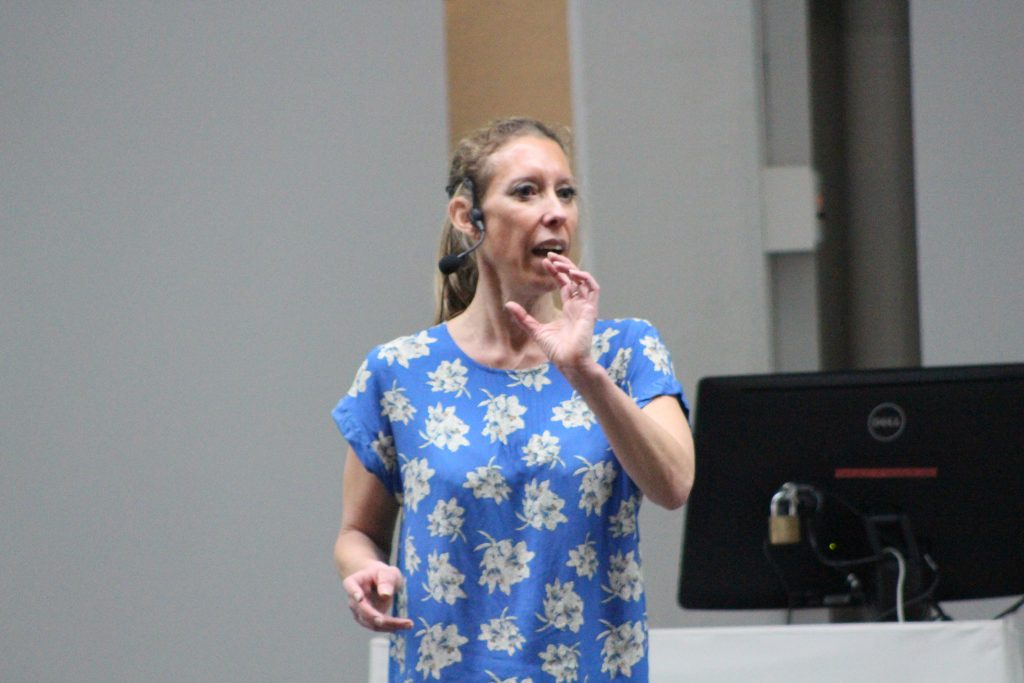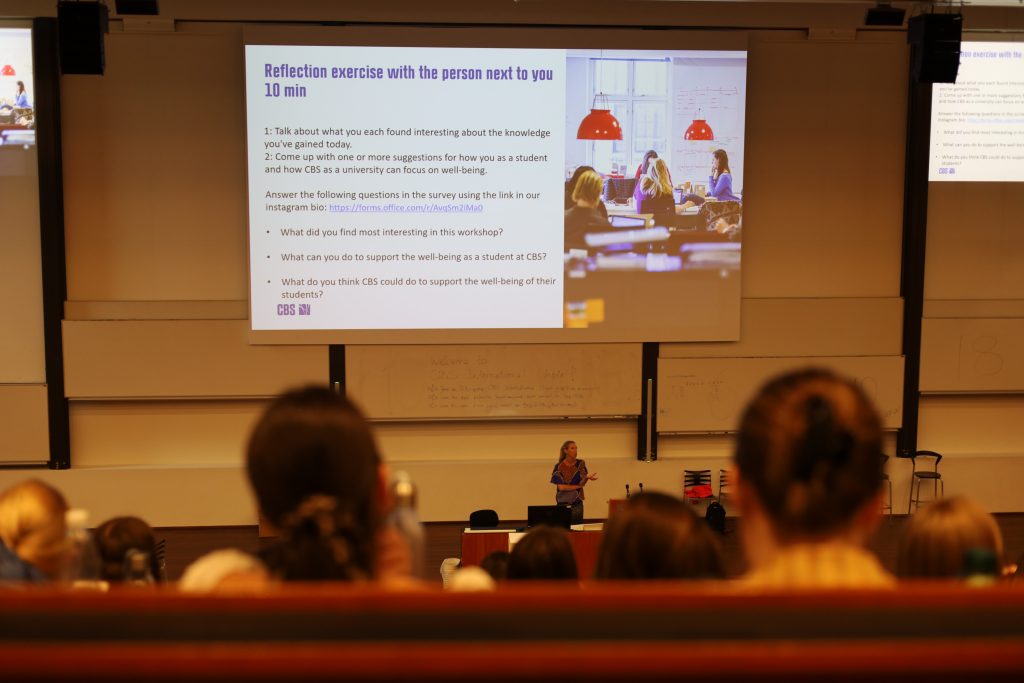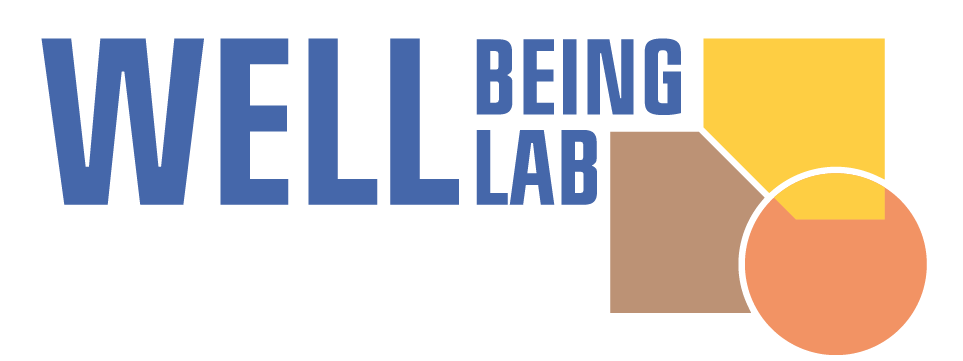Well-being Workshops

The purpose of the workshops
The aim with the workshop is to shed focus on stress prevention and well-being among students at CBS – or elsewhere – and to give the students knowledge from research and other students’ experiences, which will help understand stress and lack of well-being, normalize difficult emotions in relation to one’s study life, and give some new insights and tools to increase the well-being.
“Talk more about it. Normalize stress. This was the first time I heard this openly being talked about, and not just “hey, we have a student guidance person who you can call if you feel anything”. Of course that’s necessary, but I loved hearing about all these experiences already in the intro-week. I was surprised by how much I could recognize these feelings.” – CBS Student after workshop
The format of the workshop
Pernille can structure the well-being workshop in different ways depending on the audience and time-schedule. One format, which she has used several times for well-being workshops at CBS, is the following: About a week before the workshop students receive an introduction letter that explains the purpose and format of the upcoming workshop. The letter includes three reflection questions and a link to a podcast to listen to at home, as a preparation. In the video three students talk with Pernille about some of the main well-being themes that will be addressed in the workshop.
At the workshop Pernille’s presentation will draw on the newest knowledge deriving from her research and on the topic in general. She presents her view on the relation between stress and shame, and how this perspective gives new ways to understand and address stress-related issues with strong emphasis on strengthening relations. She will present the tendencies that she has seen from interviews and surveys with many different students, but also share some concrete examples from students’ everyday experiences and insightful citations from the interviews with students.
Often, Pernille make use of live-pools via Instagram during the workshop, which invites the students to actively engage and relate to some statements on the spot, for example to which extent they recognize some feelings or experiences other students have had. One poll could be that the students are asked to answer yes or no to the statement: “During my studies, I have experienced feeling inadequate (utilstrækkelig).” It is very insightful to see in a large group of students what the others’ are thinking too. This activity serves to highlight some of the main issues, but also normalizing it, when students can see that they are not alone in these experiences. Many students have shared afterwards that seeing these polls was ”very illuminating” and ”it made me realize that I am not alone in that situation.”
Pernille’s goal is to normalize difficult feelings, like insecurity, inadequacy, and doubt in the study life. She sees the workshops as a part of a stress-preventative effort and uses the research to show students how common these experiences are and to begin a shift in the culture about how one thinks and talks about it. Breaking myths and taboos. The feedback she receives most often is that students recognize the feelings that she address and how surprised, but also relieved, they are to hear that so many others are in the same boat.
In an Instagram live-poll done among 200 Cand.soc. students at CBS, 94% answered yes to the question that “It is a relief when others say that they also have a hard time.”
An open invitation
As Pernille’s research keeps unfolding and as new materials to work with student well-being keep being developed, the format for the well-being workshops equally will evolve and can be developed to specific situations and audiences. If you are interested in having a workshop at your institution, you are more than welcome to research out to Pernille to talk about the options: E-mail: psp.bhl@cbs.dk / mobile: +45 25129491.
“We found it interesting and encouraging to deal with the prevention of stress instead of after it has occurred.” – CBS student after workshop
Pernille Steen Pedersen gives workshops on student well-being.
Pernille Steen Pedersen has developed and tested a format for well-being workshops, which is targeted both new and experienced students. Read more on this page about the aim and format of her well-being workshops.
Focus of the workshop
- Use the research to address the issues that can influence the sense of well-being among students and break myths about the ideal CBS student in order to help students build a shared experience and community around feelings, that they otherwise might believe they are alone in dealing with.
- Provide a nuanced perspective on one’s own reactions and that of others in order to better recognize and embrace other’s feelings and reactions.
- Give students knowledge about shame and the difference between stress and being busy to help them to notice if potential signs of stress arise in them
- Inspire students to reach out for help and also to reach out to support others when needed
Feedback
At the end of the workshop, students are invited to give feedback per mail for example to the following questions: What did you find most interesting in this workshop? What can you do to support the well-being as a student at CBS? What do you think CBS could do to support the well-being of their students? Pernille uses the replies to evaluate the workshop, to develop it further, but also to keep receiving information from students about the topics that are important to their experiences of study life.
Many students gave the feedback that they had appreciated the workshop and they see it as a good initiative to begin a change in the study culture. For example some students wrote: “Learn from this workshop, listen to the results, see that the student are feeling stressed and pressured”, “Everybody gets stressed, let’s normalize the feelings and help each other”, and “I think this workshop really helped. I think being open and honest about my feelings, and talking to others about their feelings is the way.”
It was nice to see that so many students feel the same way. The fact that most people have a facade of being this great student, but feel as insecure on the inside, was particularly comforting.” – CBS Student after workshop

Workshop take-aways
The Instagram polls that Pernille uses during the workshop seems to provide some great “aha-moments” for many students. It makes an impact to witness – live on the spot – how others next to them are thinking and feeling too. One student, for example, said: “I like the quotes, because it made me realize that I am not alone in that situation”, and another wrote that it made an impact on her to see “the amount of people feeling inadequate. This insight will make me more aware or alert about how my co-students feel.” These kind of statements underline an important take-away from the workshops – that sharing and disseminating research on stress and well-being can serve a stress-preventative purpose. Instead of some students might go around thinking to themselves that they are wrong or not good enough, from a workshop they can suddenly see for themselves that this is not the case – that what they are experiencing is normal and by seeing it and sharing it with others it can reduce the pressure.
That CBS and different programs work proactively with stress prevention and well-being, was also a welcomed and noticed among students, who were glad to see this focus. One student shared that the best part of the workshop was “knowing that CBS care about our well-being and try to change things”, and another said “it is the first time I’ve felt that an “adult” or teacher has actually cared to understand where students were coming from. That’s so nice to finally hear.”
